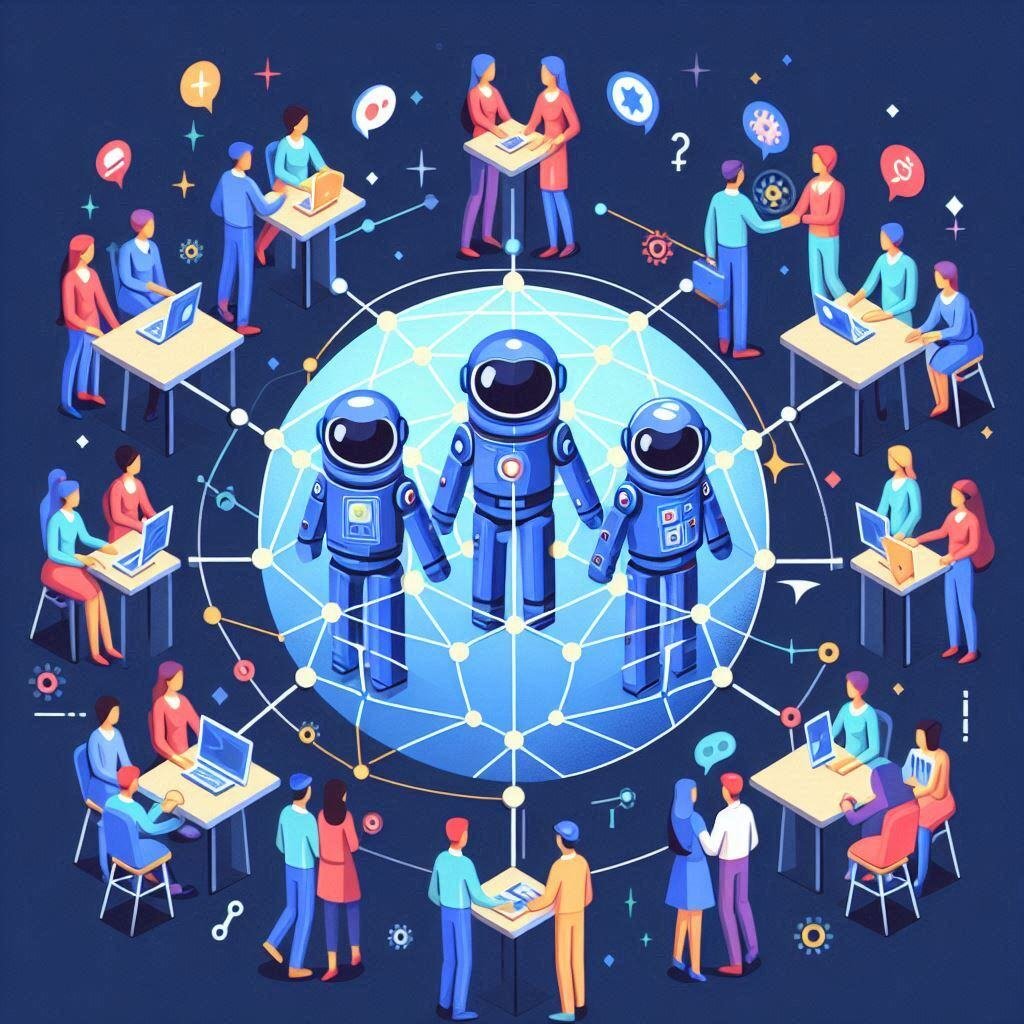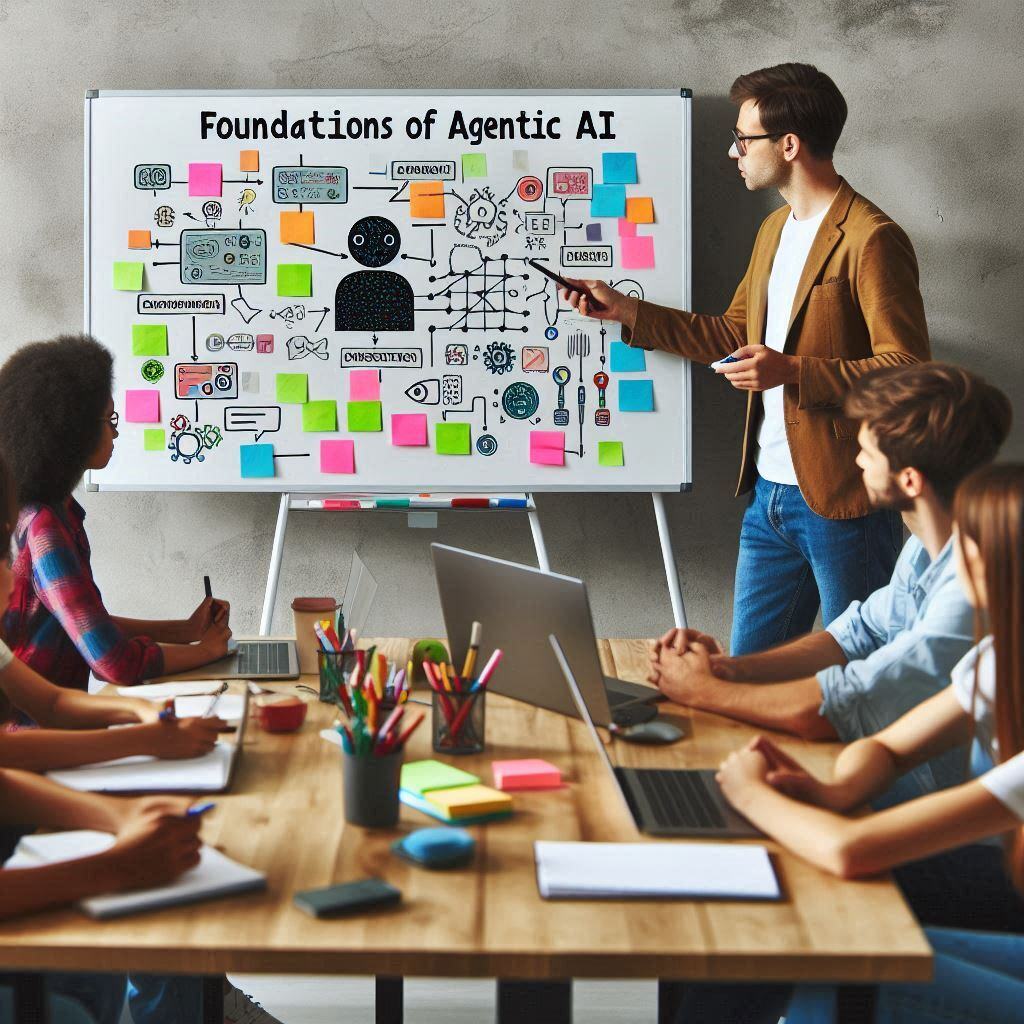3 min read
Multi-Agent Collaboration in Agentic AI
Multi-agent systems (MAS) represent a powerful AI approach where several agents work together to achieve complex tasks. Each agent operates...
As we wrap up our exploration of Agentic AI, let's take a moment to look ahead and see where this exciting field is headed. The world of AI is evolving at lightning speed, and Agentic AI is right at the forefront of this technological revolution. In this lesson, we'll dive into the latest research, emerging technologies, and what the future might hold. We'll talk about advancements in AI autonomy, the ethical questions that come with it, and how increased AI capabilities could impact our society.
1. Advancements in Autonomy and Learning
Imagine AI agents that can learn and adapt almost like humans, without needing constant supervision. Here's what's making that possible:
Smarter Learning Algorithms: Techniques like Deep Reinforcement Learning are helping AI agents learn from their experiences and make better decisions over time, much like we do when we learn from our successes and mistakes.
Learning How to Learn (Meta-Learning): This is like teaching AI agents to become quick learners. By leveraging what they've learned in the past, they can adapt to new tasks more efficiently, which is super useful in ever-changing environments.
Learning with Less Data: Advances in unsupervised and semi-supervised learning mean AI can figure things out without needing tons of labeled examples. This is a big deal when labeled data is hard to come by.
2. Integration with Edge Computing and IoT
AI isn't just something that happens in big data centers anymore—it's moving closer to us:
Real-Time Responses: With edge computing, AI can process data right where it's collected—like on your smartphone or a smart home device. This means faster responses without needing to send data back and forth over the internet.
Connected Smart Devices: As more devices become part of the Internet of Things (IoT), AI agents embedded in these devices can work together. Imagine your home appliances coordinating to save energy based on your daily routines.
3. The Quantum Leap in Computing Power
Quantum computing might sound like sci-fi, but it's becoming a reality and could supercharge AI:
Solving Complex Problems: Quantum computers can process complex calculations much faster than traditional computers. This could help AI agents solve problems that are currently too tough to crack, like detailed climate modeling or advanced drug discovery.
Enhanced Simulations: AI agents could use quantum computing to run massive simulations quickly, improving decision-making in fields that require heavy data crunching.
4. More Natural Human-AI Interactions
AI is getting better at understanding us, making interactions smoother:
Conversational AI: Thanks to advances in Natural Language Processing (NLP), AI agents can hold more natural, context-aware conversations. This means talking to an AI could feel as natural as chatting with a friend.
Emotional Intelligence: AI is beginning to recognize and respond to human emotions. This could make virtual assistants or customer service bots more empathetic and effective.
5. Collaborative Multi-Agent Learning
Not only are individual AI agents getting smarter, but they're also getting better at working as a team:
Cooperative Learning: In environments where teamwork is crucial, AI agents are learning to coordinate their actions to achieve the best group outcome.
Competitive Learning: In settings like cybersecurity or finance, agents learn to anticipate and counter the actions of others, improving their strategies and robustness.
1. Scalability and Managing Complexity
As AI systems become more complex:
The Challenge: Coordinating many AI agents can get complicated and resource-intensive. Imagine trying to organize a team where everyone speaks a different language.
The Opportunity: By developing smarter architectures and using a mix of cloud and edge computing, we can manage larger systems more efficiently, making sure all the agents work together smoothly.
2. Interoperability and Standardization
With so many AI agents from different developers:
The Challenge: Without common standards, agents might not communicate effectively, leading to fragmented systems.
The Opportunity: Establishing industry-wide standards and open-source frameworks can help agents from different places collaborate seamlessly, much like how USB standards allow devices to connect universally.
3. Security and Privacy Concerns
Increased autonomy raises the stakes for security:
The Challenge: Autonomous agents could be targets for cyberattacks, and they might access sensitive data, raising privacy issues.
The Opportunity: Implementing robust security measures and privacy-preserving techniques can protect both the agents and the data they handle, building trust in AI systems.
4. Ethical and Legal Frameworks
Navigating the ethical landscape is crucial:
The Challenge: It's complex to define responsibility when AI makes autonomous decisions, especially if those decisions have significant impacts.
The Opportunity: Developing clear ethical guidelines and legal frameworks can ensure responsible AI deployment, fostering public trust and acceptance.
5. Workforce Transformation
AI will change how we work:
The Challenge: Automation might lead to job displacement in certain sectors, causing economic and social challenges.
The Opportunity: AI can create new job categories and enhance productivity, allowing humans to focus on creative and strategic tasks. Investing in reskilling and education programs can prepare the workforce for this shift.
1. Responsibility and Accountability
As AI agents make more decisions on their own:
Ethical Concern: If an AI makes a harmful decision, who is held accountable? The developer? The user? The AI itself?
Societal Impact: Without clear accountability, legal systems may struggle to address issues arising from AI actions, leading to mistrust among the public.
2. Bias and Fairness
AI can inadvertently perpetuate biases:
Ethical Concern: If AI systems are trained on biased data, they might make unfair decisions, reinforcing societal inequalities.
Societal Impact: This can lead to discrimination and exacerbate social divisions, undermining the benefits of AI advancements.
3. Transparency and Explainability
Understanding AI decisions is important:
Ethical Concern: Black-box AI models make it difficult to interpret decisions, posing challenges in critical areas like healthcare or finance.
Societal Impact: Lack of transparency can lead to mistrust and resistance to AI adoption, limiting its potential positive impact.
4. Privacy and Surveillance
Autonomous agents often require lots of data:
Ethical Concern: Collecting and processing personal data raises privacy concerns, especially if data is used beyond its intended purpose.
Societal Impact: Intrusive data practices can infringe on individual rights, leading to societal pushback against AI technologies.
5. Human-AI Relationship
Balancing AI autonomy with human values:
Ethical Concern: Over-reliance on AI could diminish human skills and social interactions.
Societal Impact: It's essential to ensure that AI augments human capabilities rather than replacing them, promoting a collaborative relationship that enhances overall well-being.
1. Developing Ethical Frameworks
Global Collaboration: Governments, organizations, and communities need to work together to establish ethical standards and regulations that guide AI development.
Ethics by Design: Incorporating ethical considerations into the AI development process ensures that agents align with societal values from the start.
2. Emphasizing Explainable AI
Transparent Models: Investing in research that makes AI decisions interpretable can build trust and facilitate compliance with regulations.
User Education: Educating users about how AI systems work empowers them to make informed decisions and provide meaningful oversight.
3. Fostering Human-AI Collaboration
Complementary Roles: Designing AI agents that enhance human abilities promotes a collaborative environment where both humans and AI can thrive.
Skill Development: Encouraging continuous learning and adaptability prepares individuals to work effectively alongside AI agents.
4. Ensuring Inclusivity and Accessibility
Diverse Datasets: Using varied and representative data reduces bias, making AI systems fairer and more inclusive.
Broad Accessibility: Making Agentic AI technologies accessible to different sectors and communities ensures widespread benefits and reduces inequality.
5. Prioritizing Security and Robustness
Proactive Measures: Implementing advanced security protocols protects AI agents from manipulation and safeguards data privacy.
Resilience Building: Designing agents that can handle challenges and recover from failures ensures reliability and trustworthiness.
The future of Agentic AI is both thrilling and full of important considerations. As AI agents become more capable and autonomous, they'll have a profound impact on industries, the economy, and our daily lives. It's up to all of us—developers, users, policymakers—to navigate the ethical, legal, and societal implications responsibly.
By staying informed about emerging trends, engaging in discussions about best practices, and thoughtfully integrating AI into our lives, we can harness its potential for the greater good. Together, we can shape a future where Agentic AI enhances our capabilities and contributes positively to society.
Next Steps
This concludes our course on Agentic AI. Your journey doesn't have to end here!
Stay Updated: Keep an eye on leading AI research and developments to stay ahead of the curve.
Join the Community: Participate in forums, attend conferences, and engage with others interested in AI.
Apply Your Knowledge: Consider how you can responsibly incorporate Agentic AI principles into your work or projects.

3 min read
Multi-agent systems (MAS) represent a powerful AI approach where several agents work together to achieve complex tasks. Each agent operates...

3 min read
Agentic AI represents a significant evolution in artificial intelligence by empowering AI systems to act autonomously, make decisions based on...

1 min read
Agentic AI is transforming how artificial intelligence systems operate by enabling them to make autonomous decisions, collaborate across multiple...

Use the agents as they are or easily customize them for your workflows with AI Studio by Integrail.

Use Integrail Benchmark Tool to find the most efficient models and test your own agents.